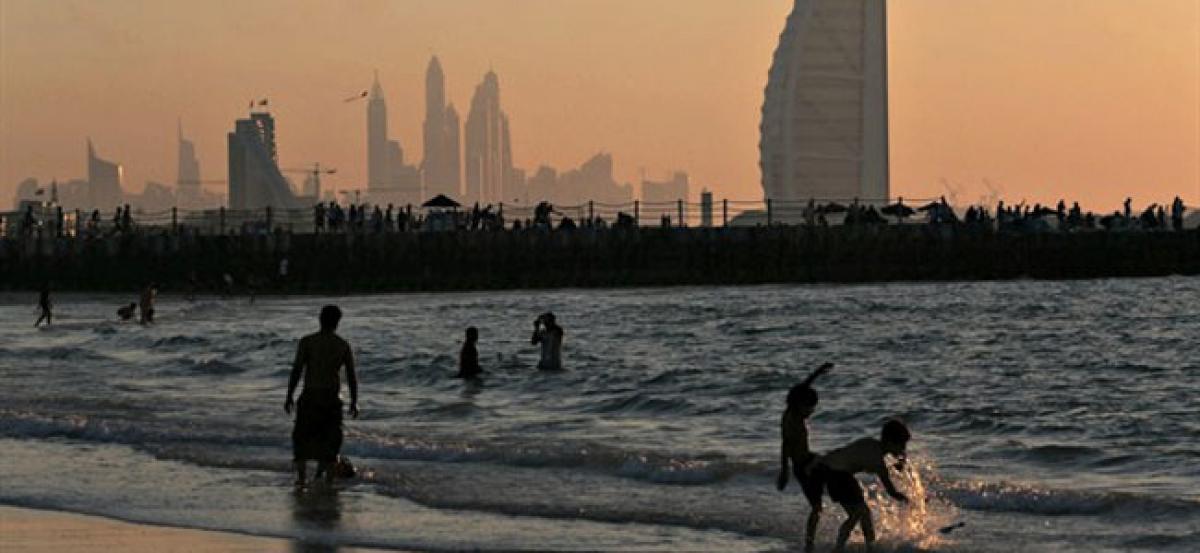Live
- Chanchalguda Jail Officials Say They Haven't Received Bail Papers Yet, Allu Arjun May Stay in Jail Tonight
- BJP leaders present evidence of illegal voters in Delhi, urge EC for swift action
- Exams will not be cancelled: BPSC chairman
- Nagesh Trophy: Karnataka, T.N win in Group A; Bihar, Rajasthan triumph in Group B
- YS Jagan condemns the arrest of Allu Arjun
- Economic and digital corridors to maritime connectivity, India and Italy building vision for future, says Italian Ambassador
- SMAT 2024: Patidar's heroics guide Madhya Pradesh to final after 13 years
- CCPA issues notices to 17 entities for violating direct selling rules
- Mamata expresses satisfaction over speedy conviction in minor girl rape-murder case
- Transparent Survey Process for Indiramma Housing Scheme Directed by District Collector
Just In

The ongoing crisis in the Middle-East is threatening to split the Gulf Cooperation Council (GCC) wide open.
New Delhi : The ongoing crisis in the Middle-East is threatening to split the Gulf Cooperation Council (GCC) wide open.
An investigative study undertaken by the International Institute for Strategic Studies, London, has revealed that the GCC has begun to disintegrate from within as a result of the rift between Qatar and the Saudi Arabia-led coalition. The collapse of the only stable regional bloc will likely affect India's interests in the Gulf since trade and commerce are the most important pillar of the India-GCC relationship.
In light of the current crisis, it is going to be challenging for India to balance a complex web of relationships to further its own interests. It must also actively engage in negotiations with individual countries to diversify trade and expand its export market. As a rising Asian power, India must look to offer help and facilitate dialogue in the troubled region, before it spills beyond control.
The economic repercussions of the conflict between Qatar and the Arab-bloc appear ominous already.
Currency and bonds manipulation
One of the most disturbing facts reported in the recent months relate to the alleged attempts at manipulation of Qatari Riyal by the U.A.E. U.A.E.-based bilinear-owned Travelex and the U.A.E. Exchange have been reportedly refusing to buy Qatari Riyal from customers. It is aimed at devaluing the currency and further hurting the country's economy. Bavaguthu Raghuram Shetty, founder and non-executive chairman of Abu Dhabi-based NMC Healthcare and chairman of U.A.E. Exchange, is allegedly leading the economic warfare on Qatar and is widely believed that he is acting on behalf of the U.A.E. Government.
Leaked e-mails of the U.A.E. Ambassador to the U.S., Yousef Al Otaiba, gave insight into the U.A.E. allegedly orchestrating the hacking of Qatari news agency (QNA) and social media sites aimed at posting incendiary false quotes attributed to Qatar's emir, Sheikh Tamim Bin Hamad al-Thani, in late May, which sparked the ongoing upheaval between Qatar and its neighbours.
U.S. intelligence has claimed the breach took place and the Washington Post reported extensively on the issue. Further revelations from his emails highlight, besides geo-political issues, another dimension of warfare in the economic arena.
The economic warfare strategy is allegedly being deployed by David Rowland, a U.K. real-estate tycoon and billionaire who sources say could be serving U.A.E.'s interests in the ongoing spat. He is the man behind the meteoric rise of Banque Havilland. He founded the bank in 2009 with the remainder of Kaupthing, the Icelandic bank that went bust. His requirement: a bank to manage his money.
Havilland has a presence in Luxembourg, London, Monaco, Liechtenstein, Bahamas, Moscow and Dubai and Rowland especially has a habit of buying weak banks. Sources say Rowland's banks are covertly attempting to buy Certificate of Deposits (CDs) of Qatari banks and selling it back to original sellers at a lower rate.
It's a complex tactic
The economic warfare strategy involves setting up a confidential commercial entity with sizeable size to buy certificate of deposits (CDs) of Qatari banks, then selling the CDs back to original sellers at a lower price, thereby reducing the market pricing. Negative global public relations campaign is done, showing instability in Qatar as a key reason for this downward pressure on CDs pricing. This will ultimately either force Qatar's financial ministry to either break the currency peg, or at least spend a lot of dollar reserves to maintain their pricing when panic initiates global buyers to sell Qatari Riyal.
The expected impact from this economic warfare strategy is to create panic among investment banks, pension funds and retail investors with regard to the stability of Qatari CDs as well as its currency. The best case scenario would force Qatar to remove its currency peg, resulting in a free fall of its currency, quite similar to what happened in the 1997 Asian crisis. It would hurt both Qatar's ability to import essential items, such as food, machinery and transport equipment. It would hurt Qatari banks' ability to raise money in global markets. The perpetrators of this strategy may have also been hoping for regime change as a collateral damage.
What can Qatar do to check such advanced planning and safeguard its economy? Prior knowledge of such financial attack is a major deterrent for others as the element of surprise is gone. By keeping a watchful eye on suspicious transactions around its bonds, CDs and forex related instruments, such a crisis can be averted. It can alert global financial watchdogs as several elements of the strategy, including black PR, with the purpose of devaluing currency, are considered illegal. Also, given its deep pockets, it could buy back its financial instruments sending the price upwards.
Should India be worried about similar economic warfare from China and Pakistan?

© 2024 Hyderabad Media House Limited/The Hans India. All rights reserved. Powered by hocalwire.com







